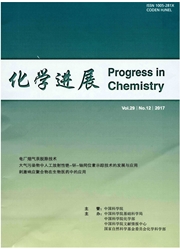

 中文摘要:
中文摘要:
本文综述了用植物细胞催化含羰基化合物的不对称转化的最新进展,并对底物结构和植物催化类型等影响反应结果的因素进行了讨论,指出了植物细胞作为生物催化剂需解决的问题。植物细胞不仅可以对映选择性地还原一些酮类和α-酮酸酯或卢-酮酸酯类化合物中的羰基,而且可以催化醛类化合物的羰基进行不对称羟氰化反应,还可以区域选择性地转化一些不饱和羰基化合物中的碳碳双键等。不同植物的细胞或同一种植物的不同细胞对底物的转化均具有不同的区域和立体选择性。底物中取代基的空间效应和电子效应也影响不对称转化的结果,但空间效应的影响更加显著。
 英文摘要:
英文摘要:
Recent progress in asymmetric transformation of carbonyl compounds using plant cells is reviewed in this paper. Using plant cells, not only carbonyl groups of some ketones and α-keto esters or β-keto esters can be enantioselectively reduced, but also asymmetric hydroxycyanidation of carbonyl groups of some aldehydes can be catalyzed. Furthermore, C=C double bonds of some unsaturated carbonyl compounds can also be regioselectively transformed. Asymmetric transformation of substrate is influenced by regioselectivity and stereoselectivity of cells from different plants even different parts of the same plant. The results of asymmetric transformation can also be affected by steric effect and electronic effect of substitute group of the substrate. Influence of steric effect on asymmetric transformation is more prominent.
 同期刊论文项目
同期刊论文项目
 同项目期刊论文
同项目期刊论文
 Discovery and Utilization of Biocatalysts for Chiral Synthesis: An Overview of Chinese Scientists Re
Discovery and Utilization of Biocatalysts for Chiral Synthesis: An Overview of Chinese Scientists Re Environmentally benign synthesis of natural glycosides using apple seed meal as green and robust bio
Environmentally benign synthesis of natural glycosides using apple seed meal as green and robust bio Assembly of a three-dimensional array of glycoconjugates by combinatorial biocatalysis in nonaqueous
Assembly of a three-dimensional array of glycoconjugates by combinatorial biocatalysis in nonaqueous Isolation of Rhodococcus sp Strain ECU0066, a New Sulfide Monooxygenase-Producing Strain for Asymmet
Isolation of Rhodococcus sp Strain ECU0066, a New Sulfide Monooxygenase-Producing Strain for Asymmet Adzuki bean: A new resource of biocatalyst for asymmetric reduction of aromatic ketones with high st
Adzuki bean: A new resource of biocatalyst for asymmetric reduction of aromatic ketones with high st Enzymatic Production of l-Menthol by a High Substrate Concentration Tolerable Esterase from Newly Is
Enzymatic Production of l-Menthol by a High Substrate Concentration Tolerable Esterase from Newly Is Biocatalytic synthesis of (R)-(-)-mandelic acid from racemic mandelonitrile by a newly isolated nitr
Biocatalytic synthesis of (R)-(-)-mandelic acid from racemic mandelonitrile by a newly isolated nitr 期刊信息
期刊信息
